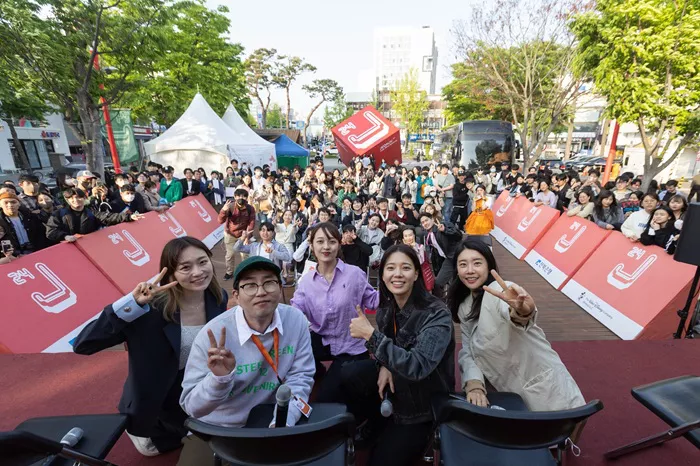Nepali poet and artist Jeevan Khatri received a prestigious red carpet recognition at the closing ceremony of the 26th Jeonju International Film Festival (JIFF) in South Korea on May 10. Khatri was honoured for his role in the critically acclaimed poetic documentary In the Land of Machines, which was selected for the festival’s special closing screening.
The documentary, which also features Nepali poets Sunildipta Rai and Dilip Bantawa, explores the lives of Nepali migrant workers in South Korea, capturing their struggles, hopes, and the role of poetry in their lives. The selection of In the Land of Machines for the closing screening is a significant accolade, as films chosen for this honour typically embody the spirit of the festival. JIFF organisers noted that the opening and closing films are considered the “faces of the festival.”
Director Kim Ok-young, assistant director Kim Sunhay, Nepali language translator Lee Giju Moona, and documentary team member Mohan Karki were also honoured during the event, which took place at the Samsung Cultural Centre of Jeonbuk National University. The closing ceremony was attended by a packed audience, including both Korean and international guests.
The Jeonju International Film Festival is one of South Korea’s premier cultural events, showcasing a wide array of international cinema. This year’s edition presented 2,497 films from across the globe, with only two films selected for the special opening and closing screenings. The opening film was Continental 25 by Romanian director Radu Jude, while In the Land of Machines was chosen as the closing highlight. Festival chair Woo Beom announced that the 26th edition of the festival achieved record-breaking ticket sales, with 85.5 percent occupancy and over 70,000 attendees over its 10-day run, from April 30 to May 9.
The documentary is based on the Nepali poetry anthology Yo Machineko Sahar Ho (This is the City of Machines), published in 2020. The collection includes 70 poems written by 35 Nepali migrant poets, offering a poignant portrayal of their lives and struggles. The anthology was translated into Korean by Lee Giju and Mohan Karki, with editing by poet Parajit Pomu. It received widespread recognition in South Korea, including the prestigious Red Award from the Labour Party’s Art and Culture Committee.
Director Kim Ok-young shared that her decision to create the documentary stemmed from her emotional reaction to the anthology. “Through poetry, they voiced their pain and protested their circumstances, which deeply moved me,” she said. “That’s when I decided to make this documentary.”
In addition to Khatri, Rai, and Bantawa, the film features poems by other Nepali poets, including Ramesh Sayan, Aishwarya Shrestha, Saroj Sarbahara, and Sanjay Kaucha. Some of these poets have already returned to Nepal, but their works continue to resonate in the documentary, offering an intimate look at the migrant experience in South Korea.
The screening of In the Land of Machines took place on May 9 at the Jeonju Digital Independent Film Theatre, with Khatri, Ok-young, and Lee Giju in attendance. This red carpet recognition underscores the growing international attention for Nepali art and literature, particularly in the context of migration and its impact on identity and expression.

